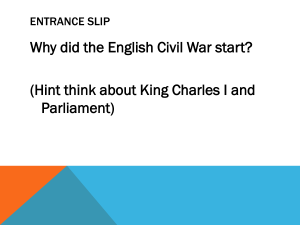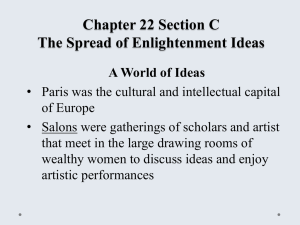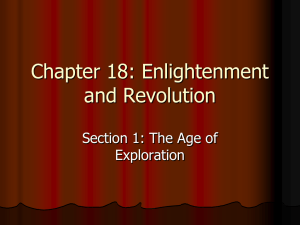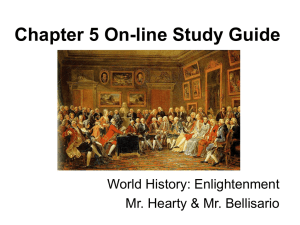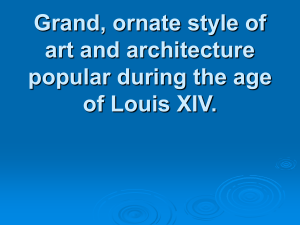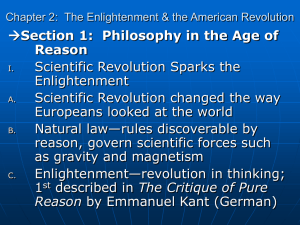Enlightenment PPT
advertisement
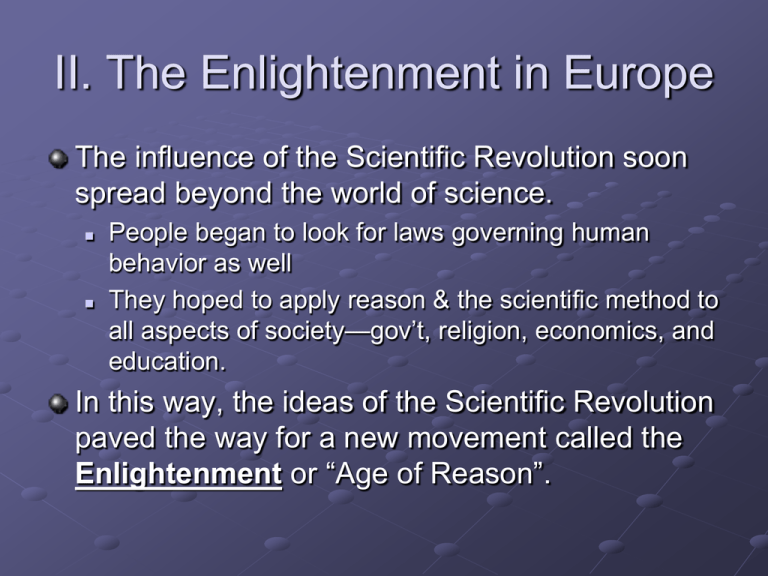
II. The Enlightenment in Europe The influence of the Scientific Revolution soon spread beyond the world of science. People began to look for laws governing human behavior as well They hoped to apply reason & the scientific method to all aspects of society—gov’t, religion, economics, and education. In this way, the ideas of the Scientific Revolution paved the way for a new movement called the Enlightenment or “Age of Reason”. Two Views on Government The Enlightenment started from some key ideas put forth by two English political thinkers of the 1600’s— Thomas Hobbes & John Locke. Both men Experienced the political turmoil of the English Civil War early in that century. However, they came to very different conclusions about gov’t and human nature. 1. Hobbe’s Social Contract In his book, Leviathan (1651), the horrors of the English Civil War convinced him that all people were naturally selfish & wicked. He argued that to escape such a bleak life, people gave up their rights to a strong ruler, and in exchange they rec’d law & order. He called this agreement, by which people created the gov’t, the social contract. Thomas Hobbes 2. Locke’s Natural Rights John Locke argued that Government could only be legitimate if it received the consent of the governed, and if it protected the natural rights of life, liberty, and property. The purpose of gov’t was to protect these rights If such a consent was not achieved, or if the gov’t failed to protect these rights, Locke argued in favor of the right of rebellion. His ideas had a deep influence on modern political thinking—most of these are the bases of modern democracy. B. Philosophes Advocate Reason The Enlightenment reached its height in France in the mid-1700’s. Paris became the meeting place for people who wanted to discuss politics and ideas. The social critics of this period in France were known as philosophes—French word for philosophers. They believed that people could apply reason to all aspects of life B. Philosophes Advocate Reason (cont.) Five important concepts formed the core of their philosophy: Reason: believed that truth could be discovered through logical thinking. Nature: to them, what was natural was also good & reasonable. Such as natural laws of economics or politics. Happiness: a person who lived by nature’s laws would find happiness. Progress: were first Europeans to believe in progress for society. Liberty: b/c of restrictions on speech, religion, trade, and personal travel they believed that society should be set free. 1. Voltaire Combats Intolerance Probably the most brilliant and influential of the philosophes was Francois Marie Arouet. Using the pen name Voltaire, he published more than 70 books of political essays, philosophy, history, fiction, and drama. Although he made powerful enemies (including the clergy, aristocracy and monarch), and had been exiled and put in prison several times, he never stopped fighting for tolerance, reason, freedom of religious belief, and freedom of speech. 2.Montesquieu & Separation of Powers Baron de Montesquieu was another influential French thinker who devoted himself to the study of political liberty. He concluded that Rome’s collapse was directly related to its loss of political liberties. Like Voltaire, Montesquieu believed that Britain was the best-governed country of his own day. He thought this was a govt, in which power was balanced among 3 groups of officials—The King, Parliament, and the English judges. He called this division of power among different branches separation of powers. 3. Rousseau: Champion Jean Jacques Rousseau: Strange, of Freedom brilliant, and controversial, he disagreed with many other philosophes. Argued that civilization corrupted peoples’ natural goodness, and the strongest people forced everyone else to obey unjust laws—thus freedom & equality were destroyed. Government should be formed freely by the people—a direct democracy. Argued that nobility be abolished His idea of the social contract differed from Hobbes’—his was an agreement among free individuals to create a society and a govt. Ideas inspired leaders of French Revolution in 1789. 4. Beccaria Promotes Criminal Justice An Italian philosophe, Cesare Bonesana Beccaria turned his thoughts to justice system. He believed that laws existed to preserve social order, not to avenge crimes. On Crimes and Punishments (1764), he railed against common abuses of justice. He argued that a person accused of a crime should receive a speedy trial, and that torture should never be used. He also believed that capital punishment (the death penalty) should be abolished. C. Women & the Enlightenment Mary Wollstonecraft (17591797) Considered the first feminist, who tried to change the traditional view towards women. Discussed the importance of educating women and improving their status in society. Wrote A Vindication of the Rights of Woman D. Impact of the Enlightenment Founding Fathers of the United States Enlightenment writers challenged long-held ideas about society. They examined such principles as divine right of kings, union of church & state, and unequal social classes. They held the traditional beliefs up to the light of reason and found them unreasonable. Their theories inspired the American & French Revolutions and other movements in the 1800’s III. Spread of Enlightenment Ideas The Philosophes’ views often got them into trouble. In France, it was illegal to criticize the Catholic Church or the government. Many philosophes landed in jail or were exiled. Voltaire, for example, experienced both punishments. Nevertheless, Enlightenment ideas spread throughout Europe. Spread of Enlightenment Ideas Social gatherings in Paris called salons attracted philosophers, writers, artists, scientists and other great intellects. Denis Diderot compiled a large set of books he called an Encyclopedia, to bring together all the most current & enlightened thinking about science, technology, art, gov’t, and more. The Enlightenment eventually reaches the middle class through, pamphlets, newspapers and even political songs With their money, the middle-class people could afford to buy many books and support works of artists. B. Art & Literature in the Enlightenment Enlightenment ideals of order and reason were reflected in the arts—music, literature, painting & architecture. European art of 1600-1700’s was dominated by the style called baroque–a grand, ornate style. Versailles (below) is an example of baroque architecture. B. Art & Literature in the Age of Reason Music was characterized by dramatic organ and choral music. New style of the late 1700’s was called neoclassical (“new classical”). In music, the style is called classical (Wolfgang Amadeus Mozart, and Ludwig von Beethoven ) The novel becomes popular in writing, especially with a wide middle-class audience. Beethoven Mozart - http://viewpure.com/o1FSN8_pp_o, http://viewpure.com/Yomi0-WL5Pg Beethoven - http://viewpure.com/4Tr0otuiQuU, http://viewpure.com/8uPGz7NU-mk Mozart C. Enlightenment & Monarchy Enlightenment spirit also spread through royal courts. Some monarchs embraced the new ideas and made reforms…they were known as enlightened despots—despot means absolute ruler. Frederick the Great of Prussia, Joseph II of Austria and Catherine the Great of Russia, all granted new religious freedoms, improved education, legal reforms, some freedoms of the press and speech, and expanded their territory. All expanded at the expense of Poland. Between 1772-95, Poland was slowly partitioned among these 3 countries until it actually disappeared from the map. Poland would not reappear again until after the end of WWI in 1918.

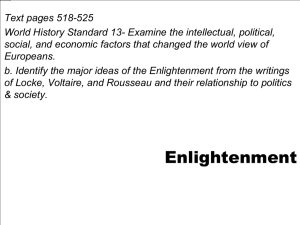
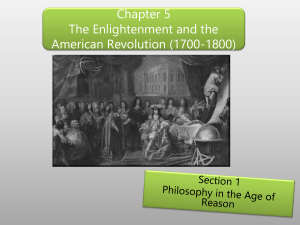
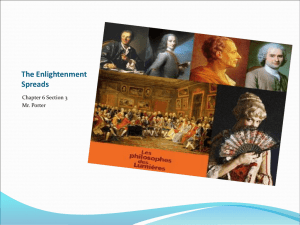
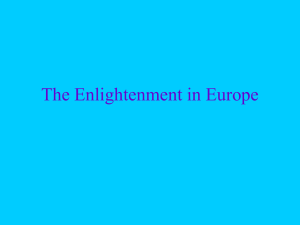
![6-2] The Enlightenment in Europe](http://s2.studylib.net/store/data/005802603_1-4aabf27e62711229ab33859d5b6ac4df-300x300.png)
